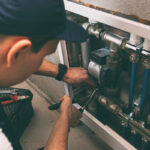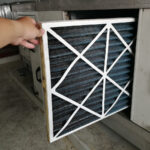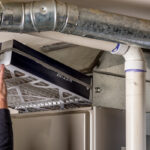
Space heaters can boost home warmth when it comes to a drafty room or chilly home office, but they can cause fires if you aren’t careful-no matter where you use them. According to the Consumer Product Safety Commission, portable space heaters are responsible for 1,700 house fires a year. Fires started by portable space heaters result in about 80 deaths annually. Veterans AC & Heat has tips for using a space heater safely.
Suppose you need a portable heater for additional heat or to replace your heater that is not working. In that case, it’s essential to prioritize space heater safety. Below are tips for safe space-heater operation and safety features to look for when choosing a space heater.
So you know, small space heaters work by convection which is the circulation of air in a room, or radiant heating. These units heat the person in the room and the occupant’s closest surroundings rather than the whole room. Radiant heaters emit infrared radiation that directly heats objects and people within their line of sight.
They are a more practical choice when you will only be in that room for a few hours and can stay within the line of view of the heater. The heaters can also be more efficient when using a specific space for a short period because they save energy.
Quick Safety Tips: Using a Space Heater
1. Install new smoke detectors on each level of your home and bedroom, and test them monthly.
2. Place the space heater on a level, hard and nonflammable surface. These appliances are meant to sit on the floor, not on a table—that increases the risk of fire and electrical hazards.
3. Turn off your heater when you leave the room that it’s heating or when you go to bed.
4. Block off a 3-foot kid- and pet-free zone around the heater, and never put a space heater in a child’s room.
We recommend choosing a thermostatically controlled heater because it can avoid the energy waste of overheating a room.
5. Choose a newer small space heater because they usually have the latest safety features.
6. Ensure the space heater carries the Underwriter’s Laboratory (UL) label.
7. Select the right size heater for the room you wish to warm up. Most heaters come with a general sizing guide. Only purchase large heaters.
8. Put the heater on a level surface away from heavy foot traffic.
9. Be careful to keep children and pets away from the heater. Place the space heater at least 3 feet away from flammable materials, like furniture, curtains, and bedding. A taller heater may need to be even further away.
10. Don’t use a heater in a workshop or garage near paint, gas cans, or matches. Turn it off when you leave the room or go to bed. Unplug the heater when it’s not in use by pulling the plug straight from the outlet.
11. Check the cord for damage periodically, and don’t use the heater if the cord is frayed or worn.
12. Don’t plug another electrical device or an extension cord into the same outlet as a heater—that can cause overheating.

Get Rid of Space Heaters that are Running Too Hot
If your space heater or its power cord is hot to the touch, turn it off and unplug it ASAP.
Wait to plug in the space heater again until you’ve had Veterans AC & Heat check it out. Or, if you’ve had the space heater for a while, consider replacing it. Do not donate the overheating space heater to a charity or put it outside for free. Even though that is thoughtful of you, it could cause a hazard for the people getting the heater.
Small Electric Space Heaters
Electric small space heaters can cost more to operate than combustion space heaters. Although they avoid indoor air quality problems, small electric space heaters still pose burn and fire hazards and should be used cautiously.
For convection (non-radiant) space heaters, the best types incorporate a heat transfer liquid, like a specific oil, and an electric element heat that. The heat transfer fluid provides heat storage, allowing the heater to cycle less and provide a more constant heat source.
When buying and installing an electric small space heater, you should follow these general safety guidelines: According to energy.gov
- “Electric heaters should be plugged directly into the wall outlet. If an extension cord is necessary, use the shortest possible heavy-duty cord of 14-gauge wire or larger. Always check and follow any manufacturer’s instructions on using extension cords.”
- “Buy a unit with a tip-over safety switch, which automatically shuts off the heater if the unit is tipped over.”
Vented and Unvented Combustion Using a Space Heater in a Small Space
Small space heaters are defined as vented and unvented or “vent-free.” Unvented combustion small space heaters are not recommended for use inside your house because there is a risk of carbon monoxide poisoning. They can also bring unwanted nitrogen oxide into the house; nitrogen oxide can cause asthma within your family and other respiratory problems. These small heaters can also introduce water vapor into the home, resulting in microbial and further structural damage. Most states have banned unvented kerosene heaters from being used in homes. California, and some other cities and counties, have banned using unvented natural gas heaters in the house.
Small space portable vented heaters are designed next to an outside wall so the unit’s gases can be vented and installed through a ceiling or wall to the outside. Look for sealed combustion or “100% outdoor air” units, which have a duct to bring outside air into the combustion chamber. Sealed combustion heaters are safer to operate than other types of space heaters. They also work more efficiently because they do not pull in the heated air from the room and exhaust it outside. The units are also less likely to backdraft and have an adverse effect on indoor air quality.
Less expensive and usually less efficient units use the room’s air for combustion. They do not have a sealed glass front to keep room air away from the heating elements and should be distinct from a sealed combustion heater.
In addition to the manufacturer’s installation and operating instructions, you should follow the general safety guidelines below for using any combustion space heater:
Never use gasoline for liquid-fueled heaters. Only use the approved fuel and follow the manufacturer’s fueling instructions. Never fill a heater that is still hot. Refrain from filling the heater because you must allow for the expansion of the liquid. Only use approved containers visibly marked for that fuel and store them outdoors.
Have your vented space heaters professionally inspected every year. Improperly vented and unvented, blocked, rusted, separated, or corroded small space heaters may put off dangerous levels of carbon monoxide (CO) and other gases into your house, causing sickness or, even worse, death. Carbon monoxide can occur if the heater is not correctly set up and adjusted for the type of gas used and the altitude at which it is installed.
Install a carbon monoxide detector if you use a small space heater.

Contact Veterans AC & Heat for More Tips on Using a Space Heater
As mentioned before, small portable electric heaters can be a convenient source of additional heat for your home in cold weather. Unfortunately, they can cause significant electric shock and fire hazards if not used properly. Fire and electrical hazards happen when space heaters don’t have good safety features—space heaters placed near combustibles or space heaters not correctly plugged in increase this risk.



